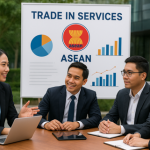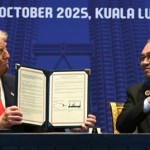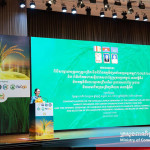Total number of posts 463.
Cooperation between Malaysia and Singapore on food security within the Johor-Singapore Special Economic Zone (JS-SEZ) holds significant potential due to their complementary strengths: Malaysia has abundant land and agricultural production, and Singapore in technology, finance and logistics. If fully embedded into the SEZ’s strategy, this cooperation could establish food security hubs, foster joint research, incentivise sustainable farming, and create bio-secure zones. Despite challenges from climate change, policy differences and resource constraints, the outlook remains promising. The JS-SEZ could emerge as ASEAN’s hub for agri-food innovation and high-tech agriculture, enhancing bilateral food resilience and contributing to regional stability.
Against the backdrop of climate change, supply chain disruptions and increasing import shocks, food security has become a strategic issue binding Malaysia and Singapore’s interests. The establishment of the Johor-Singapore Special Economic Zone (JS-SEZ) is not only a milestone in cross-border economic integration but also an exceptional opportunity for both countries to jointly build a sustainable and resilient agri-food base.
Singapore, which imports more than 90% of its food from 170 countries, was severely affected by Malaysia’s temporary chicken export ban in 2022. Malaysia, while being a net food producer, faces declining self-sufficiency in staple products, stagnant productivity, a shrinking agricultural workforce, and mounting environmental challenges. Both countries therefore share vulnerabilities but also hold complementary strengths that can be harnessed for cooperation.
Cooperation Potential within the JS-SEZ
First, leveraging comparative advantages. Malaysia has abundant land, resources and food production capacity, while Singapore contributes strengths in logistics, finance, innovation and investment. Together, they can establish a resilient and efficient food supply chain, reducing reliance on external markets.
Second, developing food security hubs. Establishing “food security hubs” that bring together farmers, cooperatives, R&D institutions, government agencies, logistics firms and investors will enable scale efficiencies, improve productivity, reduce post-harvest losses and create strategic reserves. Successful models in Europe and Asia could serve as inspiration.
Third, incentives for farmers and private capital. Johor could introduce farmer-centred policies such as yield-based rewards, sustainability incentives and shared equity models. These would provide farmers with greater ownership, attract youth into agriculture and mobilise private investment into high-tech farming.
Fourth, research collaboration and talent development. Joint research initiatives on climate-resilient crops, sustainable aquaculture and precision agriculture, combined with cross-border training programmes, will provide the technological and human capital foundation for JS-SEZ’s long-term growth.
Fifth, creating bio-secure zones. Dedicated areas aligned with international biosecurity standards can mitigate risks of disease outbreaks, ensuring stable supply even during pandemics or animal health crises.
Key Challenges
Despite strong potential, several challenges must be addressed:
(i) Risk of food security being overshadowed by high-value sectors like digital finance and advanced manufacturing within the JS-SEZ.
(ii) Climate change impacts, such as droughts, salinisation and crop disease, threatening agricultural output.
(iii) Policy and interest divergence: Malaysia prioritises domestic producers’ protection while Singapore seeks reliable external supply to meet its “30 by 30” target.
(iv) Underinvestment in R&D and limited agricultural workforce in Malaysia, which could slow down collaborative progress.
Prospects and Recommendations
AIf both governments explicitly integrate food security strategy into the JS-SEZ master plan, while promoting public–private–academic partnerships, the SEZ could evolve into:
-
ASEAN’s leading hub for agri-food innovation and high-tech agriculture.
-
A platform to strengthen bilateral resilience and self-sufficiency in food supply.
-
A regional model of sustainable food security cooperation.
Conclusion
The potential for Malaysia–Singapore cooperation on food security within the JS-SEZ is highly promising and strategically significant. Realising this vision requires strong political commitment, cross-border policy alignment, investment in infrastructure and R&D, and prioritisation of agriculture within the SEZ’s development agenda. If successful, the JS-SEZ can become a regional beacon of food resilience, ensuring stability and shared prosperity for both nations and the wider ASEAN region.
Source: South China Morning Post














